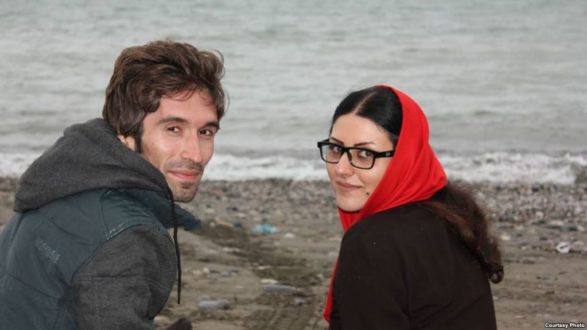radiofarda – Human Rights Watch (HRW) has called upon Iran’s authorities to immediately release a human rights activist who is suffering medical complications resulting from a hunger strike.
“Iranian authorities should immediately release Golrokh Iraee Ebrahimi, a human rights defender hospitalized in Tehran,” HRW said in an April 10 statement.
Ms. Golrokh Iraee Ebrahimi, a 37-year-old writer, was sent to prison in early October 2016 after penning an unpublished story about stoning. She was released from prison on January 3, 2017 after a 71-day hunger strike by her husband, Arash Sadeghi, and a protest campaign on social media that got international attention, but she was taken back to prison January 22 after her husband ended his hunger strike.
“The charges against Golrokh Ebrahimi Iraee are ludicrous. She is facing years behind bars simply for writing a story, and one which was not even published—she is effectively being punished for using her imagination,” said Philip Luther, research and advocacy director for the Middle East and North Africa at Amnesty International.
According to HRW, Iraee was transferred from prison to a hospital April 3, apparently suffering medical complications from a hunger strike. The authorities allowed her family to visit April 9.
“Iranian authorities are apparently so threatened by human rights defenders that they imprison them for years,” said Sarah Leah Whitson, Middle East director at Human Rights Watch, adding, “Instead of making prison conditions worse, Iran should start listening to defenders’ demands for more rights and freedom for all citizens.”
On January 24, authorities transferred Iraee and Atena Daemi, another human rights defender, from Tehran’s notorious Evin Prison to Qarchak Prison in the city of Varamin, a facility which is reputed to have worse conditions than Evin.
Daemi and Iraee began a hunger strike February 3 to protest their transfer from Evin, their families reported. Daemi ended her hunger strike February 26, but Iraee continued hers until she was transferred to the hospital April 3.
That same day, Iraee’s family traveled to Varamin in the hopes of visiting her in prison. When they arrived, authorities told them that she had been transferred to a hospital in Tehran, but refused to provide the family any information about her location or condition. Authorities finally allowed Iraee’s father to visit her at a Tehran hospital April 9. A source who wished to remain anonymous told Human Rights Watch that the visit lasted about an hour, and it was apparent that Iraee had lost a significant amount of weight.
“There is nothing to suggest that Iraee has committed any genuine crime and keeping her one more day behind bars is illegal,” Whitson said. “She should be released immediately.”
Meanwhile, Ms. Iraee’s husband, imprisoned rights activist Arash Sadeghi, has urged “all conscientious people” to call for the release of his ailing wife, reported New York based Center for Human Rights in Iran (CHRI).
“I call on all awakened, conscientious people to be the voices of Golrokh and Atena’s [Daemi’s] innocence before another tragedy takes place in the aftermath of [suspicious] suicides in the prisons,” wrote Sadeghi in an open letter from Rajaee Shahr Prison in Karaj where he has been serving a 19-year prison sentence since June 2016.
“The Islamic Revolutionary Guards Corps (IRGC) and the judiciary will be directly responsible for anything terrible that happens to them,” added Sadeghi.
A source close to the Iraee family told the CHRI April 9 that Iraee had lost more than 44 pounds and suffered frequent convulsions since starting her hunger strike in February.
“The authorities have not responded to her demands and haven’t even talked to her or visited her to see how she is,” said the source, who requested anonymity for fear of reprisals. “Golrokh has told her family that she will not stop her hunger strike until she’s returned to Evin Prison.”
 Shabtabnews In this dark night, I have lost my way – Arise from a corner, oh you the star of guidance.
Shabtabnews In this dark night, I have lost my way – Arise from a corner, oh you the star of guidance.



